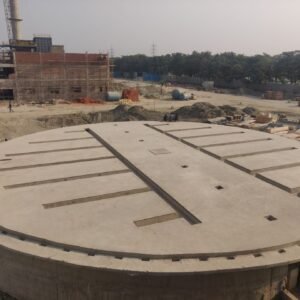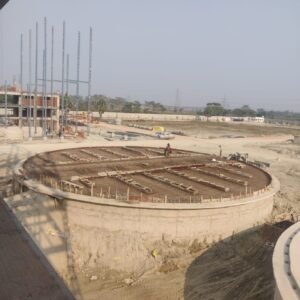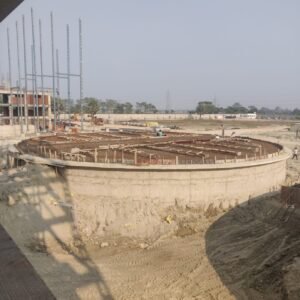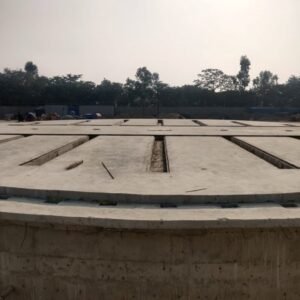Silo Civil Construction
Grain Silo Civil Construction in India: Expertise of Nirman Engineers Associates
Introduction
Silo is a crucial component of the ethanol plant. A silo is a structure used for storing bulk materials, primarily used in agriculture for the storage of grain or fermented feed known as silage. Silos are also used in industry for storing a variety of materials such as coal, cement, woodchips, and sawdust. In the landscape of Indian agriculture and industry, the civil construction of grain silos is vital. Nirman Engineers Associates stands out as a top-tier civil construction company, particularly excelling in the creation of silos for Ethanol Plants.
Silo Civil Construction: A Cornerstone of Ethanol Plants
Silos, as key components of ethanol plants, are critical for storing bulk materials. These structures are essential in agriculture for storing grain or fermented feed such as silage. The modern silo types in use include tower silos, bag silos, bunker silos, and silage piles. Tower silos are advantageous as they allow for efficient packing of hay, especially noteworthy in their upper sections.
Dimensions and Scale
Storage silos are cylindrical structures, often ranging from 10 to 90 feet in diameter and 30 to 275 feet in height. This scale signifies the importance of meticulous civil construction and foundation work.




The Role of Civil Construction in Silo Development
Civil construction plays an integral role in building these substantial silos. The foundation of a silo is crucial and must be designed according to specific requirements. The construction process involves handling numerous challenges through adept design and planning.
Challenges in Silo Foundation Construction
- Waterlogged Grounds: Foundations in such areas should not exceed a foot below the surface. Excavating waterlogged terrain is both expensive and time-consuming.
- Design Complexities: Avoiding intricate shuttering designs, particularly for stiffened rafts, is crucial to manage costs and build efficiently.
- Soil Mechanics and Ground Treatment Improvements: Advances in this field have reduced piling costs, significantly affecting the economics of standard solutions.
- Environmental Factors: Issues like sulfate attack on concrete, ground movement due to various factors, and impacts from adjacent construction activities need consideration.
- Critical Assessment of Soil Investigations: This is necessary to ensure the reliability of the soil data and its impact on construction.
Nirman Engineers Associates’ Expertise
Our proficiency in constructing foundations for massive and heavy loads is well-established. We have experience in creating foundations for holding Molasse with specific gravity of 1.47-1.48, capable of supporting substantial loads. This expertise extends to constructing silos with diameters and radii tailored to store 10000tones of Gain in one silo.
Client Portfolio: Our Pride
Nirman Engineers Associates has had the privilege of working with a wide array of esteemed clients.
Customers Review: Our Pride
Grain Silo Construction Cost: Investing in the Future
Building a grain silo is a significant investment. The costs vary depending on numerous factors such as location, capacity, and design complexity. Nirman Engineers Associates offers competitive pricing, ensuring high value for our clients.
Cost Factors and Considerations
- Rapid Construction for Immediate ROI: For clients needing quick returns, faster yet costlier construction methods might be preferable over slower, cheaper alternatives.
- Impact on Existing Structures: The new foundation loading can affect nearby structures, a factor that requires careful planning and execution.
Grain Silo Civil Construction Cost in India
The cost of civil construction for grain silos in India reflects the increasing demand for efficient grain storage solutions. Our team at Nirman Engineers Associates provides cost-effective, customized solutions, maintaining the highest standards of quality and safety.
Dos:
- Conduct Thorough Site Analysis: Before construction, perform a detailed analysis of the site, including soil testing, to determine the suitability for a silo structure.
- Adhere to Safety Standards: Follow all safety regulations and standards during construction to ensure the safety of workers and the future users of the silo.
- Use Quality Materials: Select high-quality materials that are durable and suitable for the type of grain to be stored.
- Consider Environmental Factors: Design the silo to withstand local environmental conditions such as wind, rain, seismic activity, and temperature variations.
- Plan for Efficient Storage and Retrieval: The silo should be designed for maximum space utilization and ease of grain loading and unloading.
- Ensure Proper Foundation: The foundation must be strong and stable to support the weight of the silo and its contents.
- Implement Effective Moisture Control: Design the silo to prevent moisture ingress, which can spoil the grain.
- Compaction of the Soil: Proper compaction is essential to prevent the collapse of the tower when its under load..
- Plan for Regular Maintenance: Include access features for maintenance and regular inspections to ensure the longevity of the silo.
- Consult with Experts: Engage with civil engineering experts and silo construction specialists for optimal design and construction practices.
Don’ts:
- Neglect Local Regulations and Codes: Avoid disregarding local building codes and regulations which are in place to ensure safety and compliance.
- Overlook Soil and Ground Conditions: Don’t underestimate the importance of soil conditions; poor soil can lead to foundation issues.
- Compromise on Material Quality for Cost: Do not use inferior materials to cut costs; this can lead to structural failures and safety hazards.
- Ignore Future Expansion Possibilities: Avoid designing a silo without considering potential future expansion or modifications.
- Skimp on Load Calculations: Avoid inaccurate load calculations for the silo foundation and structure; these are crucial for overall stability and safety.
- Neglect Environmental Impact: Avoid construction practices that have a negative impact on the environment.
- Overlook Insurance and Liability: Don’t forget to secure appropriate insurance for the construction phase and operational phase of the silo.
- Ignore Worker Training and Safety: Do not neglect the training and safety of the construction crew. Proper training is essential for the safe and efficient construction of the silo.
Conclusion
The demand for robust grain storage solutions like silos is on the rise in India. Nirman Engineers Associates, with its extensive experience and commitment to quality, is poised to meet this challenge, offering top-notch expertise in the civil construction of grain silos. We invite you to connect with us to explore how our services can contribute to your project’s success.
This integrated content combines the essential elements of silo civil construction, challenges, and solutions provided by Nirman Engineers Associates, ensuring a comprehensive and informative webpage. Feel free to adjust or expand any section to better fit your needs.
Our Presence

